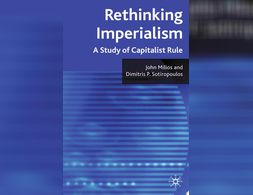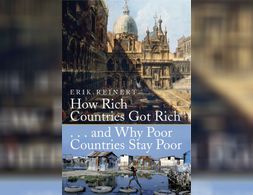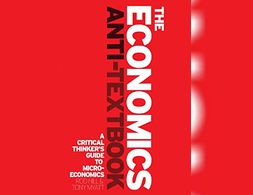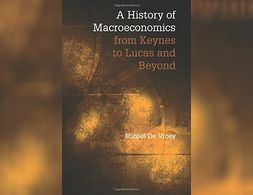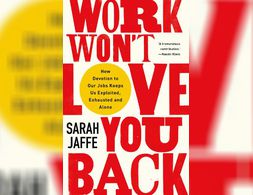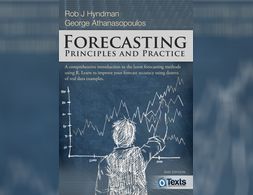✕
614 results
In this book the author develops a new approach to uncertainty in economics, which calls for a fundamental change in the methodology of economics. It provides a comprehensive overview and critical appraisal of the economic theory of uncertainty and shows that uncertainty was originally conceptualized both as an epistemic and an ontological problem.
What do modern academic economists do? What currently is mainstream economics? What is neoclassical economics? And how about heterodox economics? How do the central concerns of modern economists, whatever their associations or allegiances, relate to those traditionally taken up in the discipline?
New Tools of Economic Dynamics gives an introduction and overview of recently developed methods and tools, most of them developed outside economics, to deal with the qualitative analysis of economic dynamics. It reports the results of a three-year research project by a European and Latin American network on the intersection of economics with mathematical, statistical, and computational methods and techniques.
Following an unprecedented economic boom fed by foreign investment, the Russian Revolution triggered the worst sovereign default in history. Bankers and Bolsheviks tells the dramatic story of this boom and bust, chronicling the forgotten experiences of leading financiers of the age.
This book sets out to encourage a debate about the role that economic theory and philosophy of economics can play. A good part of economics consists of theoretical developments which describe completely imaginary worlds and have no connections to actual market economies
A Study of Capitalist Rule This book aims at presenting and assessing imperialism as a theoretical concept It aims to provide a comprehensive evaluation focusing specifically on the tension between Marx s theoretical system of the Critique of Political Economy and the theories of capitalist expansion and domination For over …
Modern Monetary Theory and Practice: An Introductory Text is an introductory textbook for university-level macroeconomics students. It is based on the principles of Modern Monetary Theory (MMT).
As a response to ongoing economic, social and environmental crises, many private actors have enlarged their definition of 'value' to include environmental and social elements. Such practices, however, appear incompatible with the current epistemological structure of academic financial discourse.
In this refreshingly revisionist history, Erik Reinert shows how rich countries developed through a combination of government intervention, protectionism, and strategic investment, rather than through free trade.
Uncertain Futures considers how economic actors visualize the future and decide how to act in conditions of radical uncertainty. It starts from the premise that dynamic capitalist economies are characterized by relentless innovation and novelty and hence exhibit an indeterminacy that cannot be reduced to measurable risk.
Colanders Macroeconomics 11e is specifically designed to help today’s students succeed in the principles of economics course and grasp economics concepts they can apply in their daily lives.
Until the end of the early 1970s, from a history of economic thought perspective, the mainstream in economics was pluralist, but once neoclassical economics became totally dominant it claimed the mainstream as its own. Since then, alternative views and schools of economics increasingly became minorities in the discipline and were considered 'heterodox'.
Mainstream textbooks present economics as an objective science free from value judgements; that settles disputes by testing hypotheses; that applies a pre-determined body of principles; and contains policy prescriptions supported by a consensus of professional opinion.
Despite some diversification modern economics still attracts a great deal of criticism. This is largely due to highly unrealistic assumptions underpinning economic theory, explanatory failure, poor policy framing, and a dubious focus on prediction. Many argue that flaws continue to owe much of their shortcomings to neoclassical economics.
This book retraces the history of macroeconomics from Keynes's General Theory to the present. Central to it is the contrast between a Keynesian era and a Lucasian - or dynamic stochastic general equilibrium (DSGE) - era, each ruled by distinct methodological standards.
Foundational economy is the most important concept you have never heard of. The foundational encompasses material utilities like water, gas and electricity and providential services like education, health and care. Taken together, these services matter economically and politically because they are the collectively consumed infrastructure of everyday life, the basis of civilization and should be citizen rights.
hether it's working for free in exchange for 'experience', enduring poor treatment in the name of being 'part of the family', or clocking serious overtime for a good cause, more and more of us are pushed to make sacrifices for the privilege of being able to do work we enjoy. Work Won't Love You Back examines how we all bought into this 'labour of love' myth: the idea that certain work is not really work, and should be done for the sake of passion rather than pay.
How did Britain's economy become a bastion of inequality? In this landmark book, the author of The New Enclosure provides a forensic examination and sweeping critique of early-twenty-first-century capitalism. Brett Christophers styles this as 'rentier capitalism', in which ownership of key types of scarce assets--such as land, intellectual property, natural resources, or digital platforms--is all-important and dominated by a few unfathomably wealthy companies and individuals: rentiers.
With a focus on Chile, Pinochet’s Economic Accomplices: An Unequal Country byForce uses theoretical arguments and empirical studies to argue that focusing onthe behavior of economic actors of the dictatorship is crucial to achieve basic objectivesin terms of justice, memory, reparation, and non-repetition measures.
After long-time negligence, the Global South and the North-South divide are back on the agenda of development economics again. This book is a neat, accessible introduction into the topic, covering both the current situation and potential remedies from different points of view.
Forecasting is required in many situations. Stocking an inventory may require forecasts of demand months in advance.
More-is-better ideals such as these have long shaped our vision of rationality. Yet humans and other animals typically rely on simple heuristics to solve adaptive problems, focusing on one or a few important cues and ignoring the rest, and shortcutting computation rather than striving for as much as possible.
This is an important contribution that defends the importance of heterodox economics. It discusses what constitutes heterodox economics as an intellectual, social, and political project, with a range of contributions from leading heterodox thinkers coming from a diversity of theoretical vantage points.
This is a good introduction to Austrian Economics for laypeople. It slowly develops the school's core principles from the thinking of its founders, all the way to key thinkers to integrate both macro and microeconomics into one coherent whole.
Leigh Phillips and Michal Rozworski examine the apparent contradiction between the demise of real-existing socialism and the rise of large corporations engaging in planning every day, making a strong argument that these planning efforts should be transformed to now fulfil the needs of the people.
The book critically engages with various Marxian perspectives on the dynamics on development and social progress It specifically engages with some key words in Marxian theory including Marx s early work on capitalist development and his later works on underdeveloped Russia Lenin s thesis on imperialism as a hurdle for …
Die Planwirtschaft hat in den letzten Jahren ein unerwartetes Revival gefeiert Die These Im Zeitalter von Big Data künstlicher Intelligenz und neuen Kommunikationstechnologien sei der Markt eine veraltete Technologie der Vergangenheit Angesichts des Scheiterns effizienter politischer und wirtschaftlicher Koordination in der Pandemie und der Klimakrise kommt diese Debatte gerade rechtzeitig …
Popularized by movies such as A Beautiful Mind game theory is the mathematical modeling of strategic interaction among rational and irrational agents Over four weeks of lectures this advanced course considers how to design interactions between agents in order to achieve good social outcomes Three main topics are covered social …
Jo Michell discusses some key implications of climate change regarding the standard policy prescriptions of Post-Keynesian economics, particularly relating to the possible necessity of consumption constraints and the presence of recurrent inflation.
Der Vortrag im Rahmen der Hamburger Klimaringvorlesung „Another World Is Still Possible“ führt in die Neue Planungsdebatte ein und stellt dar, inwieweit eine demokratische ökonomische Wirtschaftsplanung gegen die Klimakrise helfen kann.
This book provides a comprehensive description of this intriguing new area of feminist economics. It includes discussion of what constitutes feminist economics and how feminist economics is different from other approaches
An introductory course on Game Theory
We use cookies on our website. Click on Accept to help us to make Exploring Economics constantly better!






